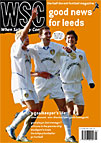 Ben Lyttleton explains why Marco van Basten, back in football after years away, has the pedigree to become the next great Dutch coach
Ben Lyttleton explains why Marco van Basten, back in football after years away, has the pedigree to become the next great Dutch coach
Marco van Basten will end his ten-year exile from football later this year when he completes his coaching qualifications and all the signs are that he will be a more successful boss than his former Milan team-mates Ruud Gullit and Frank Rijkaard.
The Dutchman has already turned down an approach to coach Milan’s forwards and is refusing work until he passes his exam this summer. Gullit has still not taken the exam while Rijkaard was coaching Holland within a year of qualifying. Both are currently out of work – Rijkaard left Sparta Rotterdam after taking them down for the first time in their history last season – and Van Basten has vowed to do things differently. “I admire Frank a lot because it takes a lot of guts to do what he did: he took on a great responsibility first time up, by taking charge of the national team, but it isn’t my idea of how to do it,” he said.
“It’s like diving into a swimming-pool without knowing if you can swim. As far as I’m concerned, I would prefer to begin my career as a coach at the bottom and in the long term, I would love to be in charge of a big club. And why not conclude it with the national team? I think it’s better that way.”
Van Basten was a reclusive figure when he first retired from football, two surgery-dominated years after his last professional game, the 1993 European Cup final in which Marseille beat Milan 1-0. “The end of my career was so sudden that I didn’t have any time for farewells,” he explained. “I never imagined it would finish that way – it was very painful. At first, I didn’t watch any games, even on TV. I’d had enough of football.”
Van Basten played tennis and golf and avoided the spotlight. When a friend told him to go to university and get a degree, he laughed: “What, and have all the students look at me? No thanks.” He occasionally watched Ajax at the Amsterdam Arena, but would get annoyed when the jumbo-screen camera picked him out and the crowd cheered his presence. His mood changed after Ajax hosted Johan Cruyff’s 50th birthday party in April 1999. “After meeting up with all the former players, I began to ask myself what I really wanted to do with my life. None of my interests has fascinated me as much as football.”
Van Basten made his Ajax debut in 1982 when he came on as a substitute for Cruyff against NEC Nijmegen and the two have remained inseparable ever since. Cruyff is Van Basten’s mentor and another reason why he will probably succeed as a coach. “Johan has taught me a lot, especially about tactics,” he said. “He was the one that told me: “You should be a coach. It would be good for you and for football as a whole.” Cruyff has already taught his protégé one key lesson: “Johan’s decisions were never influenced by fear. When he’s sitting on that bench, he has no fear. He coached with a clear vision and always made a team better. It’s a fantastic example.”
This year Van Basten has been on familiar territory – apart from a three-day trip to watch Arsenal train last October – at Ajax. “First of all I worked with the Under-19s under Danny Blind, and right now I’m working with the first team under my old team-mate Ronald Koeman. Being a coach is very complex: there are many aspects you have to learn, notably on the organisation side. I know how to handle the media, the fans and the players because I’ve been through all that as a player. But it’s one thing to know things, it’s another to be capable of transmitting them to others. I have a lot of experience as a player which makes things easier for me as a coach – although I know that being a great player does not guarantee you will become a great coach.”
Van Basten has lost his shyness but kept his humility. He speaks without Gullit’s bombast and lacks Rijkaard’s impatience at climbing the job ladder. “It takes an enormous amount of energy to coach properly,” he says, like a true disciple of Cruyff, “because it’s not only a matter of technique and tactics, but you have to move deep into the soul of your squad.”
From WSC 195 May 2003. What was happening this month